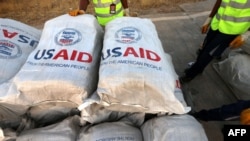ອົງການຊ່ວຍເຫຼືອຕ່າງປະເທດຂອງ ສະຫະລັດ ເຊິ່ງຖືກປິດໂດຍລັດຖະບານທ່ານ ທຣຳ ແມ່ນຖືກຕຳໜິວິຈານໂດຍ ປັກກິ່ງ ມາດົນນານແລ້ວ. ແຕ່ໃນຂະນະທີ່ອົງການ USAID ຖືກປິດລົງ, ປັກກິ່ງ ຈະພະຍາຍາມເຂົ້າມາສ້າງອິດທິພົນແທນ ຫຼືບໍ່? ນັກວິເຄາະຈຳນວນນຶ່ງເວົ້າວ່າ ເຖິງແມ່ນຈີນຢາກຈະເຂົ້າມາຕື່ມເຕັມຊ່ອງຫວ່າງດັ່ງກ່າວກໍຕາມ, ບັນຫາເສດຖະກິດຂອງເຂົາເຈົ້າອາດຈຳກັດສິ່ງທີ່ເຂົາເຈົ້າຈະເຮັດ.
ລັດຖະມົນຕີການຕ່າງປະເທດ ທ່ານ ມາໂກ ຣູບີໂອ, ຜູ້ທີ່ຕອນນີ້ ເປັນວ່າການຜູ້ອຳນວຍການອົງການເພື່ອການພັດທະນາສາກົນຂອງສະຫະລັດ, ໄດ້ກ່າວວ່າທ່ານຈະນຳເອົາກິດຈະກຳຕ່າງໆຂອງອົງການດັ່ງກ່າວມາດຳເນີນໃຫ້ສອດຄ່ອງກັບວາລະແຜນການຂອງລັດຖະບານໃໝ່.
ທ່ານໄດ້ກ່າວຕໍ່ບັນດານັກຂ່າວ ໃນຂະນະທີ່ຢ້ຽມຢາມປະເທດ ແອລ ຊາລວາດໍ ໃນຕົ້ນອາທິດນີ້ວ່າ “ເງິນຂອງຜູ້ຈ່າຍພາສີທີ່ວ່ານີ້, ແລະ ພວກເຮົາກໍເປັນໜີ້ປະຊາຊົນ ອາເມຣິກັນ ທີ່ຕ້ອງຮັບຮອງວ່າ ເງິນທຸກໂດລາທີ່ເຮົາຈ່າຍໃນຕ່າງປະເທດນັ້ນ ຈະຖືກໃຊ້ເພື່ອສິ່ງທີ່ສົ່ງເສີມຜົນປະໂຫຍດຂອງຊາດ.”
ອົງການ USAID ມີງົບປະມານປະຈຳປີຫຼາຍກວ່າ 40 ຕື້ໂດລາ ແລະ ບໍລິຫານໂຄງການຊ່ວຍເຫຼືອຕ່າງໆທົ່ວໂລກ, ລວມທັງໂຄງການທີ່ກ່ຽວຂ້ອງກັບ ຈີນ ທີ່ໄດ້ກາຍເປັນເປົ້າໝາຍຂອງການຕຳໜິວິຈານໂດຍທຳນຽບຂາວ.
ໃນເອກະສານຂໍ້ແທ້ຈິງເລື່ອງ “ຄວາມສິ້ນເປືອງ ແລະ ການໃຊ້ໃນທາງທີ່ຜິດ” ທີ່ຖືກເຜີຍແຜ່ເມື່ອວັນທີ 3 ກຸມພານັ້ນ, ທຳນຽບຂາວ ລະບຸວ່າ USAID ໄດ້ມອບເງິນຫຼາຍລ້ານໂດລາໃຫ້ກັບອົງການ EcoHealth Alliance ເຊິ່ງເປັນອົງການຂອງ ສະຫະລັດ ທີ່ເຮັດວຽກດ້ານການປ້ອງກັນໂຣກຕິດຕໍ່. ອົງການດັ່ງກ່າວ ຖືກກ່າວຫາວ່າ ເຮັດວຽກກັບສະຖາບັນໄວຣັສວິທະຍາໃນເມືອງ ວູຫານ ກ່ຽວກັບການວິໄຈໄວຣັສໂຄໂຣນາ ທີ່ເຮັດໃຫ້ເກີດການລະບາດຂອງ ໂຄວິດ-19, ທັງອົງການ EcoHealth Alliance ແລະ ລັດຖະບານ ຈີນ ຕ່າງກໍປະຕິເສດຂໍ້ກ່າວຫາດັ່ງກ່າວ.
ໃນໄລຍະບໍ່ເທົ່າໃດປີທີ່ຜ່ານມາ USAID ໄດ້ກຳນົດຂອບການລະດົມທຶນສຳລັບໂຄງການທີ່ກ່ຽວຂ້ອງກັບ ຈີນ ຫຼາຍຂຶ້ນເລື້ອຍໆ ໂດຍເປັນກົນລະຍຸດໃນການຄວບຄຸມການຂະຫຍາຍຕົວຂອງ ຈີນ ໃນລະດັບໂລກຜ່ານຄວາມຊ່ວຍເຫຼືອ ແລະ ການລົງທຶນ.
ເວັບໄຊ້ຂອງ USAID ຊຶ່ງຖືກປິດລົງແລ້ວນັ້ນ, ໄດ້ສະແດງໃຫ້ເຫັນວ່າໜ່ວຍງານດັ່ງກ່າວໄດ້ຍົກຍ້ອງ “ກອງທຶນຕອບໂຕ້ອິດທິພົນຈີນ” ວ່າ ເປັນນຶ່ງໃນ “ຄວາມສຳເລັດທີ່ສຳຄັນ.” ກອງທຶນນີ້ “ຈະສົ່ງເສີມເປົ້າໝາຍດ້ານຄວາມໝັ້ນຄົງແຫ່ງຊາດ” ເພື່ອ “ສ້າງພັນທະມິດທີ່ມີຄວາມຍືດຢຸ່ນຫຼາຍຂຶ້ນ ເຊິ່ງສາມາດຕ້ານທານແຮງກົດດັນຈາກພັກຄອມມູນິສ ຈີນ ແລະ ຜູ້ກະທຳຜິດທີ່ຮ້າຍແຮງອື່ນໆໄດ້.”
ອ່ານຂ່າວນີ້ເປັນພາສາອັງກິດ
The U.S. foreign aid agency broadly shut down by the Trump administration has long been criticized by Beijing. But as USAID projects wind down, will Beijing step in to try to build influence? Some analysts say although China will want to fill the vacuum, its own economic problems could limit what it will do.
Secretary of State Marco Rubio, who is now the acting director of U.S. Agency for International Development, said he will bring the agency’s activities in line with the agenda of the new government.
“These are taxpayer dollars, and we owe the American people assurances that every dollar we are spending abroad is being spent on something that furthers our national interest,” he told reporters while visiting El Salvador earlier this week.
USAID had an annual budget of more than $40 billion and managed aid programs around the world, including a China-related program that has become a target of criticism by the White House.
On a “waste and abuse” fact sheet released on Feb. 3, the White House said USAID had given millions of dollars to EcoHealth Alliance, a U.S. organization working on protections against infectious disease. The organization has been accused of working with Wuhan Institute of Virology on coronavirus research that had caused the COVID-19 pandemic. Both EcoHealth Alliance and the Chinese government have rejected those accusations.
In recent years, USAID has increasingly framed its fundings for China-related programs as a strategy to contain China’s global expansion through aid and investments.
An archived page of USAID’s now-closed website shows that the agency lauded its “Countering Chinese Influence Fund” as one of its “key accomplishments.” The fund "will advance national-security goals" to "build more resilient partners that are able to withstand pressure from the CCP and other malign actors."





ຟໍຣັມສະແດງຄວາມຄິດເຫັນ